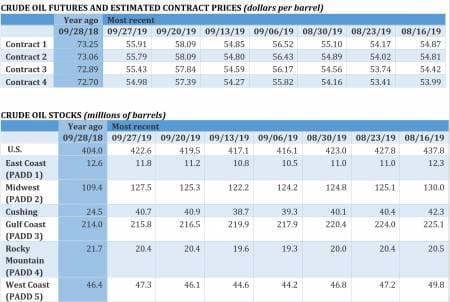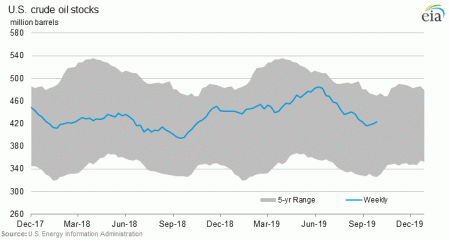Oil prices recovered somewhat early on Friday morning, but handed in gains by noon as traders continue to worry about the state of the global economy.







Oil prices dropped sharply during trading on Thursday but recovered on hopes of more aggressive action from the Federal Reserve. The U.S. jobs report on Friday revealed more weakness, but it wasn’t as poor as feared. Geopolitical risk has receded from the top of minds of oil traders. Everything is about weak demand now.
OPEC production fell most in 16 years in September. Largely due to the Abqaiq attack, OPEC’s oil production fell sharply in September. It was the single-largest disruption in history when it occurred, although its short duration meant that the outage fell short of the PDVSA strike in 2002 in terms of total volumes lost. Still, oil prices languish as demand continues to weaken. “Oil-demand growth is hitting the skids as macroeconomic, trade, and political risk drivers continue to intensify, from Brexit to impeachment through Persian Gulf conflict risk and the U.S.-China trade war,” Bob McNally, president of Rapidan Energy Group, told Bloomberg.
Unrest in Iraq puts spotlight on oil. Iraqi security forces have tried to violently suppress widespread protests in the country, and there is little sign of a resolution. Oil production has not been affected yet.
U.S. SPR more limited than expected. The U.S. strategic petroleum reserve is thought to be a massive trove of oil that can be readily deployed. For instance, in a hypothetical outage in the Strait of Hormuz, the U.S. should be expected to withdraw 3.5 mb/d of oil from the SPR. But the reserve might not be able to pull that off. Changes in pipeline flows, and huge increases in upstream production mean that only about 1.5 mb/d can be drawn down at a time, according to Platts.
Volkswagen to spend $2.2 billion on EVs. Volkswagen’s Traton truck division plans to spend 2 billion euros ($2.2 billion) over the next five years on EVs. Related: Markets Fear Oil Price Collapse: Should OPEC Cut More Production?
Investor group urges climate action. Climate Action 100+, a group of investors overseeing $35 trillion, says that of the most polluting companies in the world, only about 9 percent have aligned their operations with the Paris Climate Agreement. The investor group has already pressured oil companies, including Royal Dutch Shell (NYSE: RDS.A) and BP (NYSE: BP) to take more aggressive action.
Exxon and Shell issue profit warnings. ExxonMobil (NYSE: XOM) and Royal Dutch Shell (NYSE: RDS.A) both issued profit warnings this week ahead of their third quarter reports later this month. Exxon said its earnings would be around 50 percent lower than the same quarter last year, largely due to lower oil prices.
Ecuador to leave OPEC. Ecuador said that it would leave OPEC in January due to fiscal problems.
Norwegian sovereign wealth fund to sell $6 billion in oil and gas stocks. After a two-year process, the sovereign wealth fund in Norway received approval to move forward with a $5.9 billion sale of oil and gas stocks.
Iran says French plan for talks with U.S. “broadly acceptable.” Iranian President Hassan Rouhani said that the French proposal to restart negotiations between Iran and the U.S. was “broadly acceptable.” They include Iran refraining from work on nuclear weapons and also helping to improve security for the region. In exchange, Iran would receive sanctions relief. Still, Rouhani said that mixed messages from the U.S., including President Trump saying publicly that he would escalate sanctions, undermined the possibility of talks.
Russia’s Rosneft wants payment in euros. Russia’s Rosneft is asking buyers of an oil cargo to pay in euros. “This could be a step to reduce U.S. dollar exposure, which makes sense for Russia, given the sanctions risk,” said Carsten Fritsch, an analyst at Commerzbank AG.
Chevron using joint ventures to scale up in Permian. Chevron (NYSE: CVX) is relying on joint ventures and partnerships to help scale up production in the Permian basin, according to Reuters. For instance, Chevron has a joint venture with Cimarex Energy (NYSE: XEC), which has been profitable since 2016. Chevron also has dozens of other agreements with other shale players in Texas and New Mexico. The model gives Chevron a share of the oil, but often relies on other companies to lead on drilling.
Pennsylvania joins cap-and-trade. The largest polluting state in the U.S. northeast will join RGGI, a regional cap-and-trade program with the mid-Atlantic and northeast. Entering the carbon market will put a cap on emissions from power plants, and utilities will have to buy and sell credits to comply. The measure could put more coal plants at risk. Pennsylvania regulators will have until July 2020 to draw up rules to join. Related: Sudden Eruption Of Violence In Iraq Threatens Oil Supply
ADVERTISEMENT
More signs of financial stress for Permian drillers. Private-equity-backed American Energy-Permian Basin LLC convinced creditors to restructure $2 billion in debt, helping the company to avoid bankruptcy. The company was founded by the late Aubrey McClendon, and the company missed an interest payment in May. Meanwhile, micro-cap driller Abraxas (NASDAQ: AXAS) said it was suspending drilling operations in the Delaware basin.
Chevron says it will cut emissions. Chevron (NYSE: CVX) said that it would cut greenhouse gas emissions by 5 to 10 percent from its upstream oil operations and by 2 to 5 percent in natural gas operations from 2016 to 2023.
Washington law impacts oil-by-rail to west coast. Phillips 66 (NYSE: PSX) has curtailed shipments of Bakken oil to its refinery in Washington State because of a law limited vapor pressure in oil-by-rail cargoes. A Phillips 66 refinery manager said that law is having a “significantly negative impact to refinery profitability.”
Sec. of Energy Rick Perry to resign. The U.S. Secretary of Energy Rick Perry is set to step down before the end of the year. Perry took a trip to Ukraine in May and that trip is starting to receive scrutiny from the impeachment inquiry in Washington.
BP names successor to Dudley. BP (NYSE: BP) announced that Bernard Looney, head of the company’s upstream unit, will take over from Bob Dudley when he retires next year.
By Tom Kool of Oilprice.com
More Top Reads From Oilprice.com:
- $300 Oil: What If The Attacks In Saudi Arabia Had Destroyed Production?
- Oil Pirates: The Gulf Of Mexico’s Billion Dollar Problem
- Is This The End Of The Lithium-Ion Battery?



















The trade war adversely impacted on the three biggest chunks that make up the global economy, namely global investments, the oil industry and the economies of the oil-producing countries.
The war created uncertainty among would-be investors, depressed the global demand for oil and oil prices. In so doing, it augmented an already existing glut in the market from 1.5-2.0 mbd to an estimated 4-5 mbd. This is roughly equivalent to the recent loss of Saudi production capacity. That is why the global oil market was able to absorb the loss with hardly a whimper after the initial shock.
Only an end to the trade war could invigorate the global economy, enhance global oil demand, reduce the glut and push oil prices up.
Rather than urging OPEC+ to add more production cuts for which it will only lose market share, global efforts should go towards persuading the world’s two largest economies to end their war.
However, this is not going to be an easy job. President Trump who knows that he lost the war is fumbling for a face-saving formula to end the war and present it to the American people as usual as a victory of sorts and China who won the war will only end it on its own terms and there lies in the problem.
Dr Mamdouh G Salameh
International Oil Economist
Visiting Professor of Energy Economics at ESCP Europe Business School, London